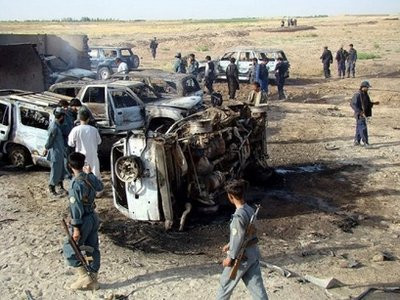Los Angeles Times, January 16, 2011
17 Afghan civilians killed by roadside bombs in 24 hours
For some Afghans, war's hardships are overshadowed by more mundane daily privations
By Laura King
Reporting from Kabul, Afghanistan — Roadside bombs killed at least 17 Afghan civilians in a 24-hour span, including nine people — a child among them — whose vehicle was torn apart by a powerful blast on Sunday as they were on their way to a wedding in northern Afghanistan.

Afghan investigators inspect the site of a suicide bombing in Gereshk district of Helmand province in 2009. A roadside bomb ripped through a minibus in southern Afghanistan, killing six civilians and wounding another three, a local official told AFP Sunday. (AFP/File/Abdul Malek)
Civilians are dying in record numbers as the war in Afghanistan grinds into its 10th year, and crude but powerful homemade bombs are the greatest hazard facing them. Insurgents plant the devices with the aim of killing Western troops, but more often it is noncombatants who are left dead or maimed.
The wedding guests, all members of the same extended family, were killed when their station wagon hit a bomb outside Pul-e-Khumri, the capital of Baghlan province, north of Kabul, provincial authorities said. Baghlan, along with a wide swath of northern territory, has become far more dangerous over the last year as the Taliban insurgency pushes outward from its traditional strongholds in the south and east.
A spokesman for the provincial government, Mahmood Haqmal, identified the dead as two men, six women and one child.
Family members and neighbors often travel together in overcrowded vehicles, particularly in rural Afghanistan, so a single bomb often has devastating results. A day earlier, in Helmand province, in the country's south, a minivan triggered a roadside bomb, killing six people, and two others were killed by an improvised explosive device in neighboring Uruzgan province, officials said.
The Helmand bombing took place in Sangin district, one of the conflict's most bitterly contested enclaves. U.S. Marines have been suffering heavy casualties in the district, as did British forces deployed there previously.
For some Afghans, war's hardships are overshadowed by more mundane daily privations. A fuel shortage has been spreading — blamed by Afghan officials on a near-blockade imposed by Iran, which borders Afghanistan to the west.
Hundreds of fuel tankers are stranded at the border, with only a fraction of the usual number trickling through.
Afghanistan's commerce minister, Anwar Haq Ahady, said Sunday that the government was trying to obtain fuel from other neighboring countries. Negotiations with Iran to allow tankers through in their usual numbers have so far been unsuccessful, he said.
Afghan officials have cited Iranian suspicions that the fuel is destined for NATO troops. NATO's International Security Assistance Force says none of its supplies come by way of Iran.
laura.king@latimes.com
Characters Count: 3375
